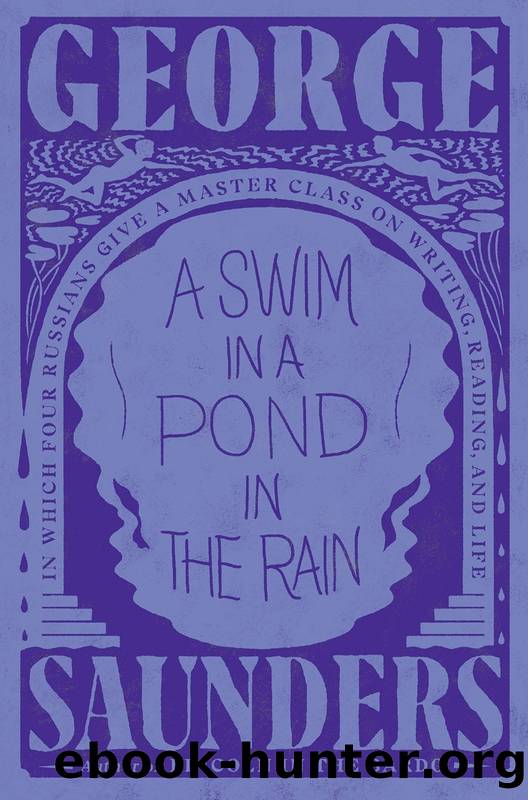A Swim in a Pond in the Rain: In Which Four Russians Give a Master Class on Writing, Reading, and Life by Saunders George

Author:Saunders, George [Saunders, George]
Language: eng
Format: epub
Tags: Writing, Classics
Amazon: B0871LKPJ3
Goodreads: 53487237
Publisher: Random House
Published: 2021-01-12T08:00:00+00:00
AND YET THEY DROVE ON
THOUGHTS ON âMASTER AND MANâ
Tolstoy: moral-ethical giant, epic novelist, vegetarian, proponent of chastity (which he failed to practice consistently, even as an old man), agricultural theorist, educational reformer, leader of an international Christian-anarchist religious movement described by Nabokov as âa neutral blend between a kind of Hindu Nirvana and the New TestamentâJesus without the church,â early nonviolence advocate with devoted disciples all over the world, including the young Gandhi. Itâs not much of a stretch to say that his fiction changed the way human beings think about themselves.
So, itâs interesting to note that his prose consists almost entirely of facts. The language isnât particularly elevated or poetic or overtly philosophical. Itâs mostly just descriptions of people doing things.
Consider this, from early in âMaster and Manâ:
â[Nikita] went as usual cheerfully and willingly to the shed, stepping briskly and easily on his rather turned-in feet; took down from a nail the heavy tasseled leather bridle, and jingling the rings of the bit went to the closed stable where the horse he was to harness was standing by himself.â
Or this, as Nikita gets down to work:
âHaving whisked the dusty, grooved back of the well-fed young stallion with the skirt of his coat, he put a bridle on his handsome head, straightened his ears and forelock, and having taken off his halter led him out to water.â
Or from their stop in Grishkino:
â âIt is ready,â said one of the young women, and after flicking with her apron the top of the samovar which was now boiling over, she carried it with an effort to the table, raised it, and set it down with a thud.â
Hereâs another color-coding challenge: on any page of the story, mark facts in one color, authorial opinions (philosophical or religious musings or aphoristic observations on human behavior) in another. Youâll find that the story is nearly all facts, heavily weighted toward factual descriptions of action. When Tolstoy does offer a subjective opinion on a character, these are rendered as objectively and precisely as Nikitaâs crossing of the yard or his preparation of the horse. And since they appear, as they do, in a matrix of facts, weâre inclined to accept them. (We accept Tolstoyâs assertion that Nikita is usually cheerful and willing in the same spirit that we accept his assertion that the bridle is leather and tasseled.)
Likewise, as weâll see in a bit, when Tolstoy recounts the thoughts or feelings of his characters, he does this succinctly and precisely, using simple objective sentences that seem factual in their syntax and modesty of assertion.
A fact draws us in. This seems to be one of those âlaws of fictionâ weâve been seeking. âThe car was dented and redâ makes a car appear in the mind. Even more so if the fact is an action: âThe dented red car slowly left the parking lot.â Notice how little we doubt that statement, the spontaneous, involuntary buy-in that makes us forget that there is no car and no parking lot.
But to say that the story is nearly all facts doesnât mean that Tolstoy is a minimalist.
Download
This site does not store any files on its server. We only index and link to content provided by other sites. Please contact the content providers to delete copyright contents if any and email us, we'll remove relevant links or contents immediately.
Cecilia; Or, Memoirs of an Heiress — Volume 1 by Fanny Burney(32548)
Cecilia; Or, Memoirs of an Heiress — Volume 2 by Fanny Burney(31947)
Cecilia; Or, Memoirs of an Heiress — Volume 3 by Fanny Burney(31932)
The Lost Art of Listening by Michael P. Nichols(7494)
Asking the Right Questions: A Guide to Critical Thinking by M. Neil Browne & Stuart M. Keeley(5762)
We Need to Talk by Celeste Headlee(5608)
On Writing A Memoir of the Craft by Stephen King(4936)
Dialogue by Robert McKee(4389)
Pre-Suasion: A Revolutionary Way to Influence and Persuade by Robert Cialdini(4224)
I Have Something to Say: Mastering the Art of Public Speaking in an Age of Disconnection by John Bowe(3878)
Elements of Style 2017 by Richard De A'Morelli(3343)
The Book of Human Emotions by Tiffany Watt Smith(3303)
Fluent Forever: How to Learn Any Language Fast and Never Forget It by Gabriel Wyner(3079)
Name Book, The: Over 10,000 Names--Their Meanings, Origins, and Spiritual Significance by Astoria Dorothy(2980)
Good Humor, Bad Taste: A Sociology of the Joke by Kuipers Giselinde(2945)
Why I Write by George Orwell(2945)
The Art Of Deception by Kevin Mitnick(2796)
The Grammaring Guide to English Grammar with Exercises by Péter Simon(2740)
Ancient Worlds by Michael Scott(2682)
